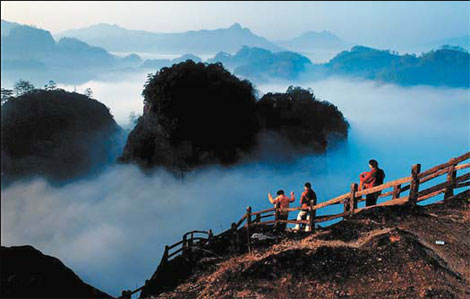Today, the rock on a hill where Wei dug the first sprout of tieguanyin is a tourist destination. On the way there, you can spend time at numerous tea farms, see how tea is picked and how it is made through a complicated process of bruising, shaping, roasting and drying.
Also visit the local wholesale tea market, which is called Tea Capital. There you can see tea farmers bringing their products and experts judging the quality. In April and November, a Tea King contest is held to select the best teas of the year.
Fenghuang Town in the north of Chao'an, Guangdong, produces a very special oolong tea, fenghuang dancong (phoenix single tree), so called because each of its many tea types is often produced on only one tree, with a very small harvest.
Phoenix single tree has probably the world's most diversified natural fragrances, with at least more than 100 kinds of natural tea fragrances.
Many of the teas are named after their fragrances. Milanxiang has the smell of orchid and the taste of honey. Guihuaxiang has the fragrance of sweet-scented osmanthus. Many other categories have the scents of different fresh flowers.
 |
|
Travelers visit the Wuyi Mountains for spectacular natural scenery and fine oolong tea.
|
With more than 900 years of tea farming history, the area probably has more old tea trees than anywhere else in the country - 3,700 trees more than 200 years old.
Although green tea is picked in late March and early April, you can also drink and buy it now. Visit East China's green tea-producing regions, like Hangzhou's West Lake, famous for longjing (dragon well) tea, and Anji for Anji Baicha, an intensely refreshing green tea. Yixing produces both green tea and black tea, as well as famous clay teapots. Suzhou's Taihu Lake area has the famous biluochun green tea.
Jasmine tea is made in August, when jasmine flowers bloom. The most famous place to visit is Guangxi's Hengxian county, which is a big jasmine-producing region. Guangxi's Liuzhou and Liubao, and Hunan's Dongtinghu Lake area produce black tea. Yunnan's Pu'er, Xishuangbanna and Menghai produce pu'er tea.
Good mountains and good waters produce good teas. While you are touring these beautiful places of China, sipping the great teas they offer will further your understanding of local people's lives and culture.
(China Daily October 1, 2008)